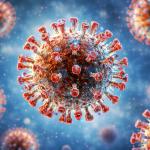Here's the real talk from Dr. Dinerstein: "This year, the Subclade K strain is predominant and is not explicitly covered by the flu vaccination. That said, the vaccine does afford some protection.
influenza
This is the video version of the latest article by Dr. Josh Bloom on flu vaccines. You can read it here.
Here are a few questions about influenza and its vaccine. It's not the best vaccine out there, but it's far better than nothing.
A recent study from Clemson University sheds some light on double-dipping your favorite appetizers at a party: does it raise your risk for foodborne illnesses?
I explained that while we’ve been trying to create a universal flu vaccine for years without success, similar efforts are ongoing for COVID-19.
The new booster, available since September, is effective against the currently dominant SARS-CoV-2 variant in the U.S., JN.1.
Since Covid hit, it's pretty much impossible to turn around and not be facing an alcohol-based hand sanitizer. We all use them without giving it much thought. But maybe it's time to give this topic some thought.
Flu and COVID-19 are examples of respiratory diseases that require repeated vaccine boosters to prevent illness.
Flu is the prototype of a respiratory disease that requires repeated – yearly - vaccination to prevent infection.











